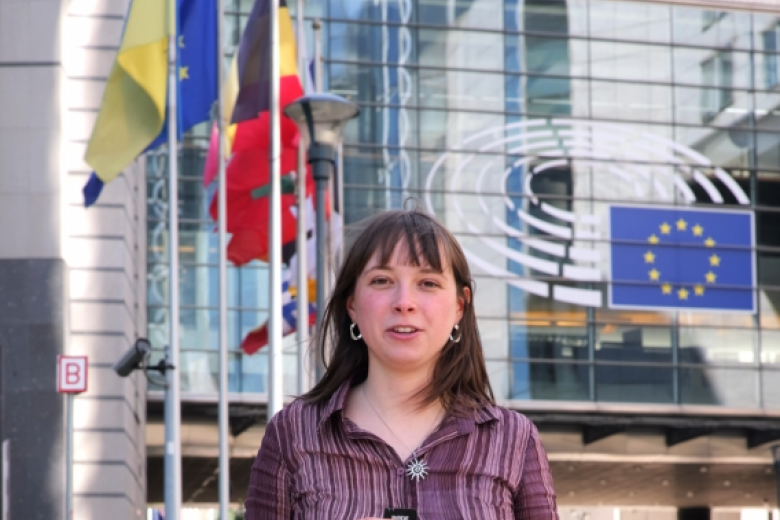A gentle heartbeat enters our being
Damien Nunes’ concept Hearttalks tries to provide timely solutions and timeless food for thought around the process of losing a loved one. It allows family members to send verbal messages from a distance while intimately listening to the beating heart of (terminal) patients unable or struggling to speak.
In an infinitely complex, highly interconnected world, where a pangolin making out with a bat (I’m not a scientist…) at a wet market thousands of miles away could interfere with your summer holiday, we might have to move away from the illusion of stability and question our ability to plan ahead. The alternatives are acceptance and finding solutions to help us cope with things outwith our control.
Damien Nunes, Innovation coach/trainer and Service Design at UMIO and the Service Science Factory, coached interdisciplinary teams during two nationwide hackathons themed around the corona-crisis. One of them won the best Human Centred Design award for a booklet that supports families seeking solace and closure during and after the final moments of a loved one when the threat of contagion prevents physical proximity.
So far, yet so close
“I thought the booklet the team developed was a really good example of a low-fi innovative solution. I love those challenges that are maybe not so sexy but nevertheless very relevant.” The research and reflection around death made him come up with his own idea around this uncomfortable subject: Hearttalks, an interface between terminally ill patients and their relatives that allows them to create their own rituals for support and closure.
Family members can send audio messages (live or pre-recorded), which the patient can receive via earphones. Crucially, the concept includes patients that might be semi- or unconscious. Giving family members a – possibly irrational – sense of being close, of being able to say what needs to be said, can support their grieving process, which, according to Nunes, starts well before death itself.
But that throws up a dilemma: “The relatives want to communicate, whether the patient can respond to it or not. If you’re at someone’s bedside and you’re not sure whether they’re conscious or not, you would still feel the need to say something.” In that case, the presence of the patient alone would allow for contemplation and a sense of communion.
The Heartbeat: something real – but gentle
But how to convey a sense of talking to someone? Dante Alighieri muses that music can unify the various spirits of our soul because they are like vapours from the beating heart. Emilíana Torrini reminds us that the heart is “beatin' like a jungle drum. Buttah doong ka doong ka doong doong doong doong.” Both might have a point. In any case, the heartbeat is something very intimate and, indeed, soothing.
Complete silence on the other end of a phone call can be distressing – as can be the sound of someone gasping for air in a panic. “I wanted something that gives you a sense of connection but that isn’t as confronting as for example a video or even audio of someone who is intubated or on a ventilator.” The warm sound of a beating heart, either live or recorded, rather than the abstract beeps of a heart rate monitor, could be that connection. “It might not be for everybody but giving additional options in these critical moments can be very valuable.”
Coming to terms with death
Nunes tries to facilitate those intimate, personal moments in this difficult time. “In the Netherlands we tend to be quite practical. Death is more and more clinical. People don’t always take time to grieve; they want and/or need to get back to work. I don’t think that is always a good thing.” COVID-19 has confronted people not only with death but also with our attitudes and rituals surrounding death.
When his grandfather was dying in Groningen, Nunes had to cross the entire country to get there in time. “I was glad I could be in the room when he passed. He hyperventilated and was unconscious when I arrived. He was physically there but I couldn’t sense his spirit. The moment he passed away, he gasped for air one more time, opening his eyes and I could sense his presence again. It was intimate and intimidating at the same time… nevertheless, it was a beautiful moment I wouldn’t want to have missed out on…”
Hearttalks also works as a play on words referring to the difficult conversations surrounding death. The concept allows people to come up with their own rituals such as reserving time to listen to the patient’s heartbeat and reminiscing together. Beyond the individual level, Nunes hopes his concept will inspire healthcare organisations to expand the emotional support given to relatives before, during and after the passing of a loved one.

Nunes hopes to start the dialogue, personalise the solution and test a prototype in a clinical setting with the help of academics from the UM community and care professionals and institutions from the region.
You can watch the concept video here
Also read
-
Europe Day
To celebrate Europe Day on 9 May, FASoS student Lisa travelled to Brussels to meet with five of our inspiring alumni who are currently shaping European policy and advocacy. In this video, they share why Europe Day matters, how it’s celebrated in Brussels, and what the idea of Europe means to them.
-
The Green Office Catalyses Circularity Projects’ Autonomy
This semester, the Green Office cultivated the untapped potential of the Community Garden and the Clothing Swap Room. We hope that these Circularity Projects will operate under autonomous, functional organisations by this time next year, with continued support from the Green Office and the SUM2030 team... -
Evidence-based health tips for students: the science of eating healthy
In the upcoming months, we’ll share tips on Instagram for our students on how to live a healthier life. Not just a random collection, but tips based on actual research happening at our faculty. The brains behind this idea are L ieve Vonken and Gido Metz, PhD candidates at CAPHRI, the Care and Public...